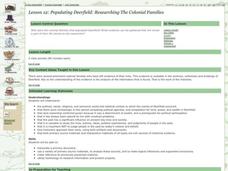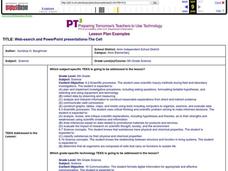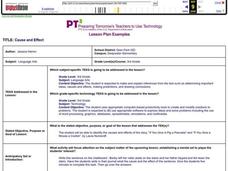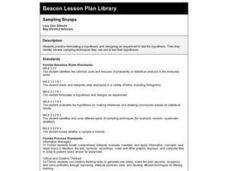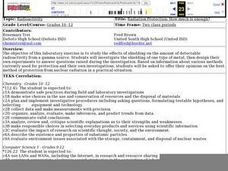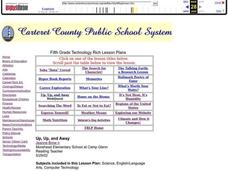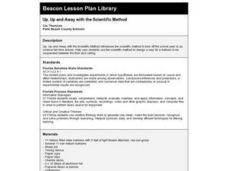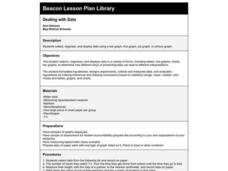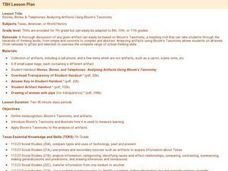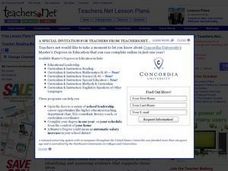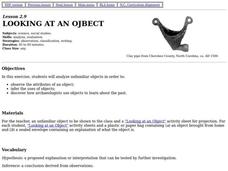Curated OER
The Story of How Deerfield Came to Be
Eleventh graders explore how the native peoples had lived in the Connecticut Valley for nearly 10,000 years, prior to the English settlement and how their culture and life ways were markedly different from that of the English settlers.
Curated OER
Populating Deerfield: A Workday for Researching the Colonial families
Eleventh graders explore who were the colonial families that populated Deerfield and what evidence can be gathered that reveals a part of their life stories to the researcher.
Curated OER
Web-search And PowerPoint Presentations-The Cell
Sixth graders create a PowerPoint presentation using information that they have compiled from their web search and rubric web sites, text and other applicable references. They work in pairs to complete these searches and projects.
Curated OER
Cause and Effect
Third graders identify the causes and effects of the story, "If You Give A Pig a Pancake" and "If You Give a Mouse a Cookie", by Laura Numeroff. They write a cause and effect story using Kidspiration.
Curated OER
Black History Month
Students work in cooperative pairs to research information and give oral presentations about African American men and women who have made significant contributions to U.S. history.
Curated OER
Sampling Snoops
Students practice formulating a hypothesis and designing an experiment to test the hypothesis. They identify several sampling techniques they can use to test their hypotheses.
Curated OER
Epidemiology: Graphing and Analyzing Health Data
Students graph data on fetal and infant mortality rates collected by the Centers for Disease Control and Prevention. They identify trends in the data and propose potential causes for the trends.
Curated OER
Lab Report Template
Students write a paragraph (complete sentences) which explains what they did in the lab.
Curated OER
RADIATION PROTECTION: HOW MUCH IS ENOUGH?
Students study the effects of shielding on the amount of detectable radioactivity from a gamma source. They investigate the shielding of one type of metal, then design their own experiments to answer questions raised during the...
Curated OER
The Human Body Systems - Lesson Plan
Students identify the following organ systems in the human body and state their functions: muscular, skeletal, circulatory, respiratory, digestive.
Curated OER
The Brain and the Sense Organs - Lesson Plan
Students identify the five sense organs and state the uses of the five senses.
Curated OER
Up, Up, and Away
Fifth graders participate in a WebQuest that introduces them to a study on clouds and how they relate to weather systems.
Curated OER
Up, Up and Away with the Scientific Method
Students utilize the scientific method to design a way for a balloon to be suspended between the floor and the ceiling.
Curated OER
Dealing With Data
Students collect, organize, and display data using a bar graph, line graph, pie graph, or picture graph. They write a summary describing the data represented and compare the graph to another graph in the class.
Curated OER
Saving Money Through Mathematics
Third graders discuss light sources and collect data about energy sources. They compare data and create a multiple line graph showing energy used by light sources for each student in the group. They present their graphs and write a...
Curated OER
Map the Mystery!
Seventh graders read the novel, "The House of Dies Drear", and create a story map to analyze the plot and recall events.
Curated OER
Could You Repeat That?
High schoolers participate in an oral story telling activity designed to show how story embellishments occur. They read "Beowulf" and identify incongruities that suggest additions and embellishments over the years.
Curated OER
Underground Railroad
Fourth graders use internet cites to explore the Underground Railroad. They also learn the importance of the Emancipation Proclamation. Focus questions are included.
Curated OER
Digging Deeper in Mission San Saba
Seventh graders explain Spanish motives for establishing Mission San Sab?? and the reasons for the mission's failure. This lesson should be used when students already have an understanding of the Spanish mission-presidio system in Texas.
Curated OER
Stones, Bones & Telephones: Analyzing Artifacts Using Bloom's Taxonomy
Seventh graders define metacognition, Bloom's Taxonomy, and artifacts. They, in groups, try to identify a mystery artifact using the Artifact Analysis sheet. They present their findings to the class.
Curated OER
Learning From Leaves: Adaptations To Differing Light Levels
Students, in groups, examine plants with different light levels. They are given plants from a tropical and desert region. They write a hypothesis at the beginning of the experiment.
Curated OER
Forest Activity: Forest Layers
Students examine the forest layers and types of forests. They explore a website, read content on forest layers and the effects of environmental conditions, sumarize the characteristics of a forest type and present the information to the...
Curated OER
Cause and Effect SDAIE Lesson
Fifth graders read two Mexican folktales and discuss cause and effect. They draw a cause and effect relationship from one of the stories.
Curated OER
Looking At An Object
Young scholars observe the attributes of an object, infer their uses, and discover how archaeologists use objects to explore the past.



